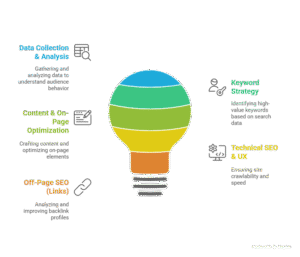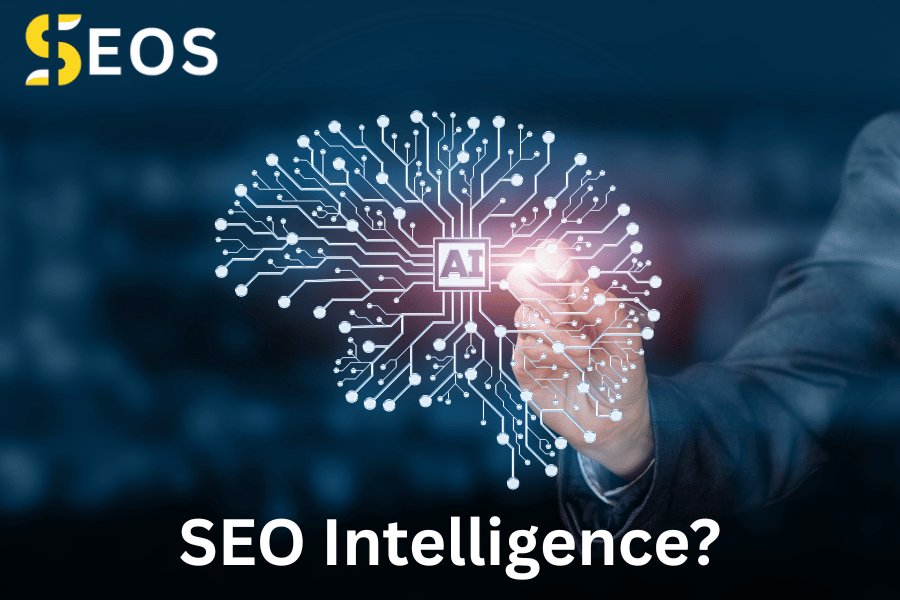SEO intelligence is the practice of using search and website data to make your SEO smarter. In simple terms, it means gathering metrics (like keyword rankings, site traffic, user behavior and competitors’ performance) and analyzing them to guide your SEO strategy. Instead of guessing which keywords or changes will help, you use real data and analytics tools to see what’s working. In essence, SEO intelligence replaces guesswork with evidence-based decisions. This data-driven approach gives businesses a competitive edge by spotting opportunities faster and growing organic traffic more effectively.
Data is at the heart of SEO intelligence. It involves tracking and analyzing lots of information: which keywords users search, how people navigate your site, what content they engage with, and how your rankings shift. In practice, this means using SEO tools (like Google Analytics, Search Console, rank trackers, etc.) to understand search behavior, user intent and competitor actions. For example, if one topic suddenly spikes in popularity, SEO intelligence tools will flag that change so you can update or create content quickly. In this way, raw numbers and charts are turned into an actionable SEO plan that adapts over time.
Key Components of SEO Intelligence
SEO intelligence works by combining several core elements. Key components include:
-
Data Collection & Analysis: Gather data from search engine results (SERPs), analytics platforms, and user interactions. Data analysis is central to SEO intelligence – you look for trends in keywords, traffic, click-through rates, and user behavior to understand what your audience wants.
-
Keyword Strategy: Use real search data to identify high-value keywords and topics. Rather than guessing keywords, SEO intelligence finds which queries have strong traffic and match user intent. This can include spotting new long-tail or local search trends that competitors may have missed.
-
Content & On-Page Optimization: Use insights to craft or tweak content, title tags, headings, and meta descriptions. For instance, if data shows people search for “best eco coffee in Brisbane,” you’d optimize a page with that exact phrase. High-quality, relevant content is central to SEO intelligence; the right keywords and user-focused content help pages rank.
-
Technical SEO & UX: Ensure your site is crawlable and fast. Technical audits (checking page speed, mobile-friendliness, crawl errors, schema markup, etc.) are part of SEO intelligence. Search engines reward sites that perform well technically, so you use data (like Core Web Vitals) to find and fix issues.
-
Off-Page SEO (Links): Analyze and improve your backlink profile. SEO intelligence tools show which sites link to you or your competitors, so you can focus link-building on high-authority sources and fill gaps in competitors’ strategies.

Each of these components feeds into the next, forming a cycle: collect data → optimize where the data leads → measure results → repeat. By treating SEO as an ongoing, data-driven process, nothing gets left to chance.
Why SEO Intelligence Matters
Using SEO intelligence delivers clear benefits over traditional, guess-and-check SEO:
-
Data-Driven Decisions: Every strategy choice is backed by real metrics, not hunches. As one expert notes, SEO intelligence allows a team to “make data-driven decisions to enhance [a] website’s visibility, rankings, and traffic”. This precision means less wasted effort and better targeting of resources.
-
Improved Visibility & Traffic: By focusing on what the data says works, you boost your chances of ranking higher. Indeed, analysts have found that this modern, AI-powered approach to SEO is “essential for driving organic traffic”. In practice, SEO intelligence helps you focus on the right keywords and content, attracting more of the qualified visitors who convert.
-
Competitive Advantage: SEO intelligence gives you deep insight into competitors. It provides “deep visibility into [the] competitive landscape”. You can see exactly which keywords rivals are winning or where their content falls short. Armed with that knowledge, you can target the gaps in their strategy and outrank them.
-
Holistic Search Insight: When combined with broader search intelligence, it offers an end-to-end view of the search ecosystem. SEO intelligence “provides end-to-end insight across all SERP components, text ads, display ads, shopping, local ads, and organic”. In other words, you understand the full customer journey across paid and organic search. This holistic view lets you coordinate SEO with other marketing channels (like PPC or local listings) for consistent messaging and maximum impact.
Overall, SEO intelligence ensures your SEO budget is spent smarter. Instead of chasing every trend blindly, you focus only on tactics proven by data. The result is stronger rankings, more relevant traffic, and a clearer path to ROI.
Traditional SEO vs. SEO Intelligence
Traditional SEO often meant periodic audits and reactive updates: you’d notice a rankings drop or changing search behavior and then scramble to fix it. SEO intelligence flips that approach. It’s proactive. Modern tools use machine learning to predict and adapt before problems occur. In fact, about 84% of SEO professionals report that AI now influences their SEO strategies. That means most teams today are already relying on data and AI to stay ahead. For example, instead of waiting for a Google algorithm update to hurt your traffic, predictive analytics might warn you in advance. In short, SEO intelligence treats SEO as a living process – you continuously monitor signals and optimize on the fly – rather than a one-off checklist.
The Role of AI and Predictive Analytics
Artificial intelligence (AI) supercharges SEO intelligence by spotting patterns that a human alone might miss. AI-driven tools can sift through vast amounts of search data (from queries to user engagement) and identify trends instantaneously. For instance, AI-powered predictive analytics can forecast changes in search engine trends and user behavior. This is like having a crystal ball for SEO: you can adjust your strategy before competitors do. Marketers are already catching on – about 84% now use AI to align content with user intent. AI also automates many routine SEO tasks (such as generating meta descriptions, finding content gaps, or auditing site issues), freeing up time for strategy and creativity. In practice, SEO intelligence means combining human expertise with AI efficiency: the AI spots the signals and the marketer turns those insights into high-quality content and improvements.
Putting SEO Intelligence to Work
How do you start using SEO intelligence in practice? Here are some steps and tools to integrate:
-
Analytics & Search Console: Use Google Analytics and Search Console to see how users find and interact with your site. These tools show which pages get the most traffic, what keywords bring visitors, and where users drop off.
-
Keyword & Rank Tracking Tools: Tools like Ahrefs, SEMrush, Moz or Google Keyword Planner help you track rankings and find new keyword opportunities. They let you monitor how your rankings change day-to-day and compare your keyword performance to competitors.
-
Technical Audits: Run regular site audits with tools like Screaming Frog or Sitebulb. Look for crawl errors, broken links, slow pages, and mobile issues. SEO intelligence flags these problems early so you can fix them before they hurt rankings.
-
Content & Competitive Analysis: Use content tools (like Clearscope or Surfer SEO) to analyze top-ranking pages for a keyword. SEO intelligence involves seeing what content ranks (and why), then refining your pages accordingly. Also track competitors’ backlink profiles and content calendar – data here reveals what’s working in your niche.
-
AI SEO Assistants: Consider AI tools for research and ideation. For example, AI can suggest related keywords, generate topic ideas, or even draft content outlines. Always review AI output for accuracy, but it can speed up your workflow.
Importantly, stay human-focused. Use the data to answer real user questions and provide genuine value. As you implement changes, remember Google’s emphasis on quality: content should reflect your expertise and trustworthiness. In other words, use SEO intelligence to create helpful, authoritative content – not just to stuff keywords.
Conclusion
SEO intelligence turns search optimization into a smart, ongoing strategy. By continually gathering data, learning from it, and applying the insights – often with AI’s help – you keep your SEO strategy agile and effective. The payoff is clear: better rankings, more qualified traffic, and a sustainable competitive advantage. In a fast-changing search landscape, being data-driven is no longer optional.
At SEO Services Brisbane, we apply SEO intelligence every day to help businesses grow online. Whether it’s a local Brisbane shop or a global ecommerce brand, we use analytics and AI insights to fine-tune SEO and keep clients ahead of competitors. By embracing SEO intelligence – and combining it with our industry expertise – any website can improve its visibility and achieve lasting success on search engines.





Comments are closed